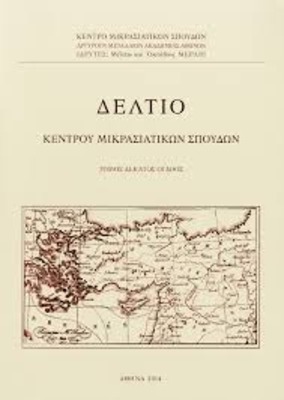Η διάχυση της εθνικής ταυτότητας στις ορθόδοξες κοινότητες της Κιλικίας
Part of : Δελτίο Κέντρου Μικρασιατικών Σπουδών ; Vol.11, 1995, pages 181-238
Issue:
Pages:
181-238
Parallel Title:
The diffusion of national identity among the Greek orthodox communities in Cilicia
Section Title:
Articles
Author:
Abstract:
During the first decade of the 20th century the flourishing Greekorthodoxcommunities in Cilicia were entangled in a bitter conflict with the Patriarchate ofAntioch over the issue of the vacant metropolitan see of Adana and Tarsus. Thisconflict, although of ecclesiastical nature, became of critical importance inforging and diffusing a new form of collective identity in the area. Until the late19th century religion was the dominant factor shaping the collective identity ofthe Greekorthodox communities in Ottoman Cilicia. Orthodoxy ensured thecohesion of these communities, despite their multilingual and multiculturalcharacter. The predominant language was Turkish although Arabic and Greekwere also in use. Threats to the community’s cohesion were characteristicallyidentified on the ground of religion. In this respect it was other Christian confessions,chiefly protestantism, that were regarded as the main challenges oforthodox identity. Thus both lay and ecclesiastical leaders directed their effortsagainst the prosyletizing zeal of western missions.The conflict with the Patriarchate of Antioch became the catalyst that shiftedtraditional allegiances and caused the Orthodox communities to undergo deepideological changes. At first, these changes involved a new perception of thePatriarchate of Antioch. This old guardian of Orthodox Christianity came to beregarded as an Arab national institution which administered the church inviolation of established practices and the Canon Law. Such a perception perhapswas not groundless, especially after the election of Meletios Dumani as Patriarchof Antioch in 1899. Hence the communities declined to accept clerics chosen bythe Patriarch of Antioch for the metropolitan see of Adana and Tarsus and at alatter stage, demanded its secession from Antioch and its union with thePatriarchate of Constantinople. Through this conflict Orthodox communitiescame increasingly under the influence of nationalism. The once homogenousOrthodox community was now perceived in national terms and its members weredivided along national lines, as «Arabs» and «Greeks». Though national definitionsof belonging were only gradually accepted, they eventually prevailed Nationaldiscourse proved an expedient language for expressing political demands butin the process existing criteria of collective identity were transformed.Cultural features such as language acquired a specific national meaning. Sincelanguage was acknowledged as part of national identity, the multilingual profile ofthe community became problematic. Linguistic fragmentation, a feature of noimportance in the contex of a religious community, had to be accounted for andbe dealt with Considering the multilingual environment of the community, it became difficult to promote the status of Greek language without resorting tospecific measures. Thus links with national and educational societies in Greecewere established to spread education in greek. Yet, shifts of meaning were notlimited to language alone. History and perceptions of space were also reinterpretedin the same way. The complex nature of the Orthodox community was underminedby historical narratives and geographic references that laid emphasis onits national character and reinterpreted the history of the region accordingly. Byunderlining nationality as the bond of the community, these new interpretationsattempted to establish links strong enough to detach, imaginatively, the Orthodoxcommunities of Cilicia from their traditional perceptions of community and tolink them with the Greek national community in the Ottoman Empire. Thusnational discourse, despite its rather belated appeareance in relation to an issue ofpurely ecclesiastical nature, was succesful in redifining notions of collectiveidentity and diffusing new understandings of community, language, history and education.
Subject (LC):




